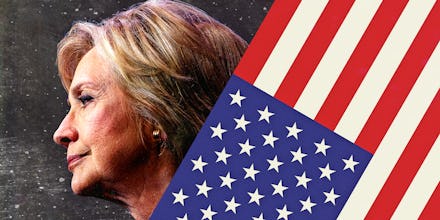American Muslims despise Donald Trump — but they aren't happy with Hillary Clinton, either

Hillary Clinton seemed the clear winner of the presidential debate at Hofstra University Monday night. But many American Muslims were frustrated by the comments she made about their communities.
During the debate, the Democratic nominee scolded her notoriously Islamophobic opponent, Donald Trump, for vilifying Muslim people.
"Donald has consistently insulted Muslims abroad, Muslims at home," Clinton said. Trump has called for a "ban" on Muslims entering the United States, and for a "registry" to track those already living there.
But Clinton's reasoning was that American Muslims are valuable allies in the fight against terrorism — rather than the simple fact they, too, are Americans and deserve to be treated as such.
"They're on the front lines," Clinton explained. "They can provide information to us that we might not get anywhere else. They need to have close, working cooperation with law enforcement in these communities — not be alienated and pushed away as some of Donald's rhetoric, unfortunately, has led to."
Many critics felt Clinton's comments framed Muslims as merely the sum of their functionality, understanding them primarily through the stereotyped — and implicitly xenophobic — context of national security.
"It's a tragedy ... that the choices between the candidates is one that believes in a generalized castigation and banning of Muslims," said Rafia Zakaria, a human rights attorney, "and another who champions a ... liberal interventionism where the only utility of Muslim Americans is as informers working to substantiate the premise that terror is something endemic to Muslims in general."
Dr. Hatem Bazian, an Islamic studies lecturer at the University of California at Berkeley, added the link Clinton draws between Muslims and national security perpetuates a reductive "good Muslim-bad Muslim" dichotomy.
"Eventually, this [association] leads to [Muslim Americans'] status being contingent upon whether or not they're good for us in national security," Bazian said, "rather than their full participation and engagement as U.S. citizens or residents in this country."
He added that there's much more to American Muslims that both candidates let on Monday.
"There are more to Muslims than just national security," Bazian said. "[Clinton's is] a mischaracterization and a reductionist approach to American Muslims on the national landscape."
Zakaria, Dr. Bazian and other Muslims are equally concerned by Clinton's track record on civil liberties, and her hawkish foreign policy.
In 2001 and again in 2006, Clinton voted for the Patriot Act — a piece of legislation which allowed for vast surveillance of individuals suspected of terrorism, with no warrant needed — which resulted in discrimination against, and the incrimination of, many American Muslims.
Clinton also supported the bloody 2011 regime change in Libya, and before that, the 2003 U.S. invasion of Iraq, which resulted in the deaths of more than 500,000 Iraqis.
Clinton's endorsement of a proposed 2016 bill prohibiting citizens on the U.S. "no-fly" list from purchasing firearms is functionally an Islamophobic endeavor: according to Slate, it legitimizes the list's dubious criteria, whereby American Muslims have been added without any sort of due process and made to go to great lengths to be removed.
The bill has been predominantly backed by Democrats.
Yet despite Clinton's often unsettling history with and rhetoric about Muslims, Zakaria concedes that she is the better choice between the two.
"It's the reality," she said, "[that] HRC is the better choice between two awful options."